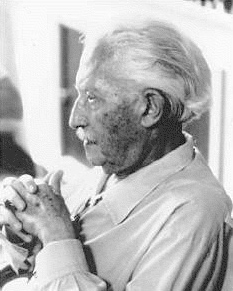Erik Erikson
| Erik Erikson | |
|---|---|
 | |
| Nome completo | Erik Homburger Erikson |
| Nascimento | 15 de junho de 1902 Frankfurt |
| Morte | 12 de maio de 1994 (91 anos) Harwich |
| Nacionalidade |  Alemanha e Alemanha e  Estados Unidos Estados Unidos |
| Ocupação | Psicologo |
| Principais trabalhos | Teoria do desenvolvimento psicossocial |
| Prémios | Prémio Pulitzer de Não Ficção Geral (1970) |
Erik Homburger Erikson (Frankfurt, 15 de junho de 1902 — Harwich, 12 de maio de 1994) foi um psicólogo do desenvolvimento e psicanalista alemão-americano conhecido por sua teoria sobre o desenvolvimento psicológico dos seres humanos. Ele cunhou a expressão crise de identidade.
Apesar de não ter diploma universitário, Erikson atuou como professor em instituições proeminentes, incluindo Harvard, Universidade da Califórnia, Berkeley, e Yale.[1] Uma pesquisa da Review of General Psychology, publicada em 2002, classificou Erikson como o 12º psicólogo mais eminente do século XX.[2]
Bibliografia
Principais obras
- Childhood and Society (1950)
- Young Man Luther: A Study in Psychoanalysis and History (1958)
- Insight and Responsibility (1966)[3]
- Identity: Youth and Crisis (1968)[4]
- Gandhi's Truth: On the Origins of Militant Nonviolence (1969)
- Life History and the Historical Moment (1975)[5]
- Toys and Reasons: Stages in the Ritualization of Experience (1977)[6]
- Adulthood (livro editado, 1978)[7]
- Vital Involvement in Old Age (com J. M. Erikson e H. Kivnick, 1986)[8]
- Erikson, Erik H.; Erikson, Joan M. (1997). The Life Cycle Completed extended ed. New York: W. W. Norton & Company (publicado em 1998). ISBN 978-0-393-34743-2
Coleções
- Identity and the Life Cycle. Selected Papers (1959)[9]
- "A Way of Looking at Things – Selected Papers from 1930 to 1980, Erik H. Erikson" ed. por S. Schlein, W. W. Norton & Co, New York, (1995)
Referências
- ↑ «Erik Erikson». Encyclopedia. 2018
- ↑ https://doi.org/10.1037%2F1089-2680.6.2.139
- ↑ Erikson, Erik H. (1994). Insight and responsibility : lectures on the ethical implications of psychoanalytic insight Norton pbk. ed. New York: W.W. Norton. ISBN 0-393-31214-3. OCLC 31741383
- ↑ Kemph, John P. (1969). «Erik H. Erikson. Identity, youth and crisis. New York: W. W. Norton Company, 1968». Behavioral Science (em inglês). 14 (2): 154–159. ISSN 1099-1743. doi:10.1002/bs.3830140209
- ↑ Erikson, Erik H. (1975). Life history and the historical moment First ed. New York: Norton. ISBN 0-393-01103-8. OCLC 1055523
- ↑ Erikson, Erik H. (1978). Toys and reasons: stages in the ritualization of experience. [S.l.]: Boyars. ISBN 0-7145-2629-0. OCLC 315744364
- ↑ Erik H. Erikson (1978). Adulthood: essays 1st ed. New York: Norton. ISBN 0-393-01165-8. OCLC 3414835
- ↑ Erikson, Erik H.; Joan M. Erikson; Helen Q. Kivnick (1986). Vital involvement in old age 1st ed. New York: Norton. ISBN 0-393-02359-1. OCLC 13821644
- ↑ Erikson, Erik H. (1959). Identity and the life cycle : selected papers. [S.l.]: International Universities Press. OCLC 1016208029
 | Este artigo sobre uma pessoa é um esboço. Você pode ajudar a Wikipédia expandindo-o.
|












